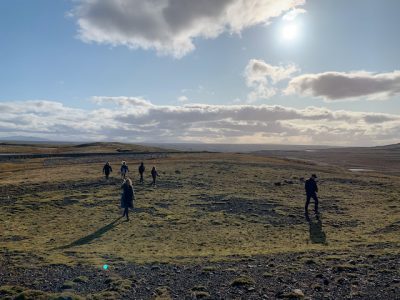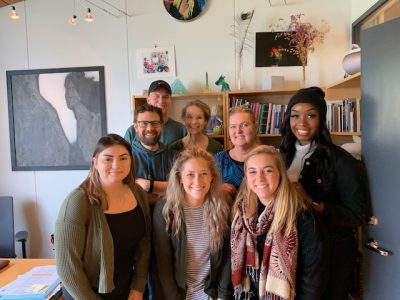Reflecting on an I-CUREUS Internship
by Mikayla Young, May 2020
 The year 2019-2020 has brought with it many new experiences and challenges; however, one of the most notable opportunities I have received this year was being able to be part of a social sciences research team. This inter-disciplinary team led by Dr. Paul Peters is based in the Department of Health Sciences and combines social science research with data analysis, community engagement, and hypothesis-driven evidence evaluation. The project in which I am a part of, is exploring the evidence for recruitment and retention of mental health care practitioners in rural and remote communities.
The year 2019-2020 has brought with it many new experiences and challenges; however, one of the most notable opportunities I have received this year was being able to be part of a social sciences research team. This inter-disciplinary team led by Dr. Paul Peters is based in the Department of Health Sciences and combines social science research with data analysis, community engagement, and hypothesis-driven evidence evaluation. The project in which I am a part of, is exploring the evidence for recruitment and retention of mental health care practitioners in rural and remote communities.

Sam Petrie, Dr. Paul Peters, Eva-Lena Lindstrom, Lára Stefánsdóttir, Claudia Sendanyoye, Mara Ostafichuk, Mikayla Young, Michele LeBlanc
Through the I-CUREUS ‘Free Range’ program, I was table to accompany my fellow student researchers and Dr. Paul Peters to Akureyri, a small town in Northern Iceland, in order to further explore rural health and well-being in a practical setting. This training-oriented trip gave us the opportunity to learn and hear firsthand about the lives and experiences of the individuals living remotely. Part of this program was to speak with a diversity of people. This included an opportunity to speak at length with the head mistress of the local high school, which has won numerous awards for innovation in education. The headmistress, Lára Stefánsdóttir, was also in charge of the local dispatch and organization of the search and rescue team. This was an invaluable experience, in which I gained so much knowledge and interesting learning opportunities. It was also a great chance to further my understanding of the research I am doing and allowed me to better my understanding of the context of rural and remote living.
Shortly after returning from Iceland, I traveled with fellow students and Professor Paul Peters to Golden Lake, Ontario. There, I was given the opportunity to work with the other students in running a day-long workshop regarding rural health. The day consisted of directed exercises and table discussions on different topics and sectors of rural health. During this time, the other students and myself led these discussions and took notes on the responses of the local participants at our tables.
The workshop was successful and had many willing and knowledgeable participants who were and are continuing to actively work in the pursuit to better their health care systems, and access to adequate and appropriate care rurally. This was a great experiential learning opportunity and worked well to provide myself with a contextual foundation for doing social research as well as rural health research.
Currently, working alongside graduate student Claudia Sendanyoye, I am conducting a title screening and structured scoping review on pre-existing research and literature written on this topic. A scoping review is meant to “examine the extent (that is, size), range (variety), and nature (characteristics) of the evidence on a topic or question; determine the value of undertaking a systematic review; summarize findings from a body of knowledge that is heterogeneous in methods or discipline; or identify gaps in the literature to aid the planning and commissioning of future research” (Tricco, A. 2028, p.467) The methods for scoping review differ depending on the topic being explored.
Scoping reviews require several different steps and methods to obtain the desired outcome of the research in which you are studying. Some of these different methods include: “focus on a specific topical area, a well-defined research question, rationale regarding inclusion and exclusion criteria, and clearly defined procedures and responsibilities for all researchers” (Peterson, J. 2016. p.13). As Claudia and I already have a well-defined research question outlined, we are now in the step of the methodology where we are in the process of discussing and outlining all rationale for inclusion, and exclusion.
Some of the challenges which we faced during this process, were narrowing down our search terms. Initially, we received a lot of literature from our searches that were not applicable to our research question. However, after changing small things, and taking away certain words that changed the outcome in our searches, we were able to greatly limit this and filter our results. Although, there were still many articles uncovered that did not pertain to our project. It was important for us to be specific regarding which articles could be applicable and which could not be. The blurred lines there often posed a challenge during this stage.
I am excited to continue moving forward in this project and to continue to grow and learn during the process. Claudia and I will now move forward in working on the next stages of our methodology, before identifying the key indicators, trends and patterns for recruitment and retention for mental health care practitioners, followed by charting and graphing the results.
References
Peterson, J., Pearce, P., Ferguson, L. & Langford C. (2016) Understanding Scoping Reviews: Definition, Purpose, and Process. Journal of The American Association of Nurse Practitioners. 12-16. doi:10.1002/2327-6924.12380
Tricco, A., Lillie E., Zarin W., O’Brien, K., Colquhoun, H., Levac, D., Moher D., Peters. M., Horsley, T., Weeks, L., Hempel, S., Chang, C., McGowan, J., Stewart, L. Hartling, L., Aldcroft, A., Wilson, M., Garritty, C., Lewin, S., …Straus, S. (2018) Research and Reporting Methods. Annals of Internal Medicine. 467-485. doi:10.7326/M18-0850